Disclaimer: The opinions expressed in this guest post are solely those of the guest author.
Editor’s Note: Featured image shows the author during Prednisone (left), which caused her to gain 45 pounds, and after stopping the medication (right).
When I entered my first relationship in high school, I was 16. I was extremely naive about anything having to do with sex. My mom, along with my boyfriend at the time, wanted me on birth control; I was indifferent and went along with it. Because of her negative experiences with many other contraceptives, my mom believed the IUD was best for me.
One day while I was still 16, she took me to a Planned Parenthood, where one of her doctor friends worked. I had no idea what to expect, and before I knew it my legs were in stirrups, and my cervix was being dilated, with heavy pain meds administered to be able to insert the IUD. I had not had any sexual experiences before this. This left me traumatized, in pain, and confused about what sex even was.
Adverse effects and misdiagnoses
From the beginning, I had serious issues with the Mirena IUD, including headaches and prolonged periods which often lasted 14 days. Planned Parenthood doctors told me to take 800 mg of ibuprofen every four hours until the bleeding stopped. I did not realize how bad that was for you, and it didn’t stop the bleeding.
About a year and a half later in the last month of my senior year at 17, I began to get rashes. This quickly intensified with rashes covering my entire body, debilitating joint pain, and 104-degree fevers. This went on for three months while I underwent countless blood tests, doctor appointments, and a 10-day hospitalization. I feared I was going to die.
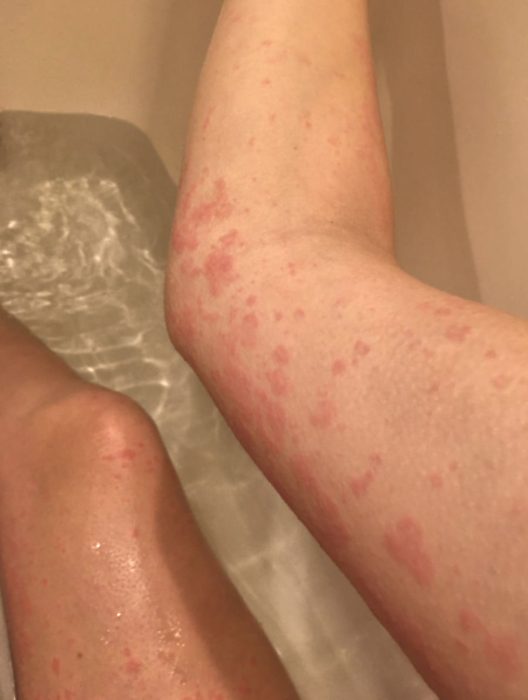
Hives on Melanie’s arm and leg (Photo courtesy of the author – do not reprint)
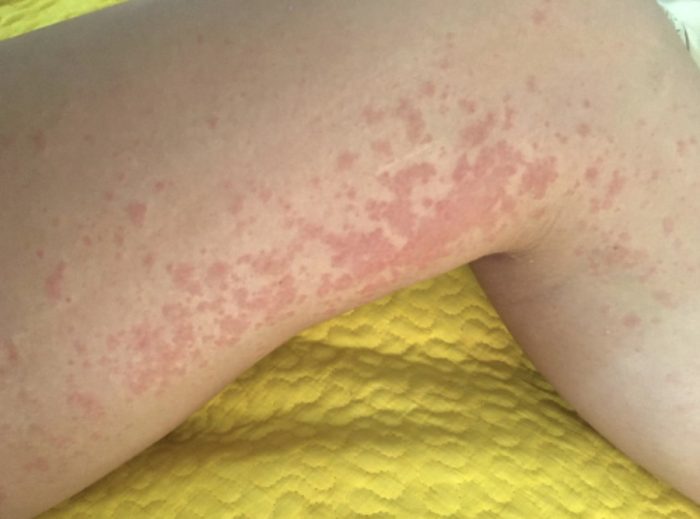
Hives on Melanie’s leg (courtesy of the author – do not reprint)
I was eventually diagnosed with an autoimmune disease (systemic vasculitis, later changed to junior rheumatoid arthritis — a misdiagnosis I could write a whole other story about). I was treated for this with seven different medications for five years. In those five years I relapsed three times and had other urgent care visits and medications added.
During this time of visiting multiple doctors, not once was it ever suggested that my birth control could be the cause of my illness — and some even discouraged me from removing it.
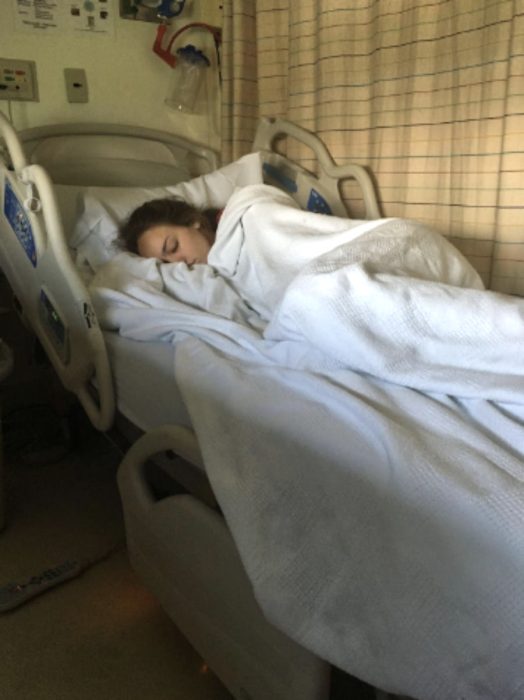
Melanie during her 10-day hospitalization (photo courtesy of the author – do not reprint)
Fast forward five years: I am off of most of my medications, all of which gave me horrible side effects, and it is time to replace my IUD. I relied on my IUD and thought if I did not replace it and I got pregnant, my life would be over. That is the narrative: getting pregnant = life is over.
I decided to go with an IUD that is supposed to be more fit for people who have not had children. I got the Liletta IUD — and the replacement procedure was an exceedingly painful experience.
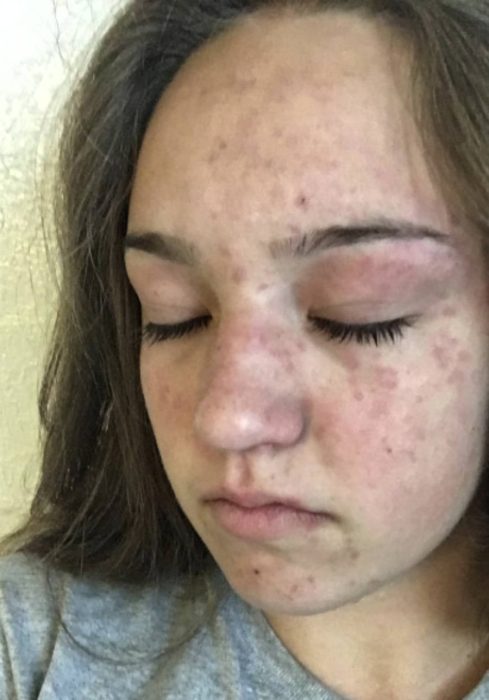
Hives on Melanie’s face (photo courtesy of author – do not reprint)
From the beginning, I knew it was a mistake.
I ended up in urgent care and was admitted to the hospital. This second hospitalization was another traumatizing experience where I was misdiagnosed again, given an antibiotic treatment that did nothing because I had no infection, and was discharged without any of my symptoms improving. And yet, I was continually encouraged to keep my IUD in.
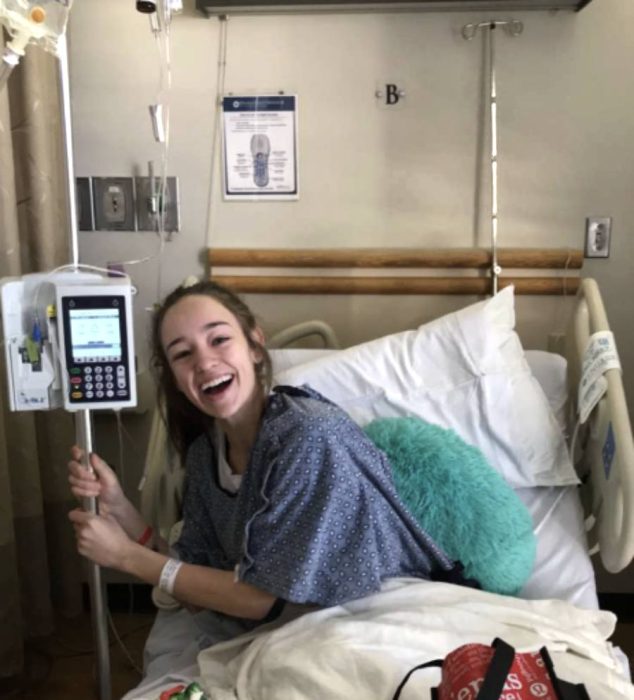
Melanie during a subsequent 4-day hospital stay (photo courtesy of author – do not reprint)
I now know that I was experiencing the rupture of multiple (at least five) ovarian cysts. When I had suggested this diagnosis to doctors, I was dismissed; instead, they suggested my boyfriend had given me an STD — despite the fact that my STD panel was completely negative, and despite an ultrasound scan that confirmed the presence of visible cysts.
About a month later, the IUD embedded in my uterus. The pain was so excruciating, I fainted in my boyfriend’s (now fiancé’s) arms on the floor of my bathroom.
Terrified to go back to the ER, I scheduled an appointment with my primary care doctor because it was the soonest available. At that point, I had no idea the IUD was embedded — and my doctors were unable to remove it. I was referred to a gynecologist, who said I needed to have it surgically removed. This process took about two weeks during 2020, when all “non-essential” procedures were on hold.
I had an IUD embedded in my uterus for two weeks before I could have it removed. I was unable to do anything, including work.
Unfortunately, my journey did not end there.
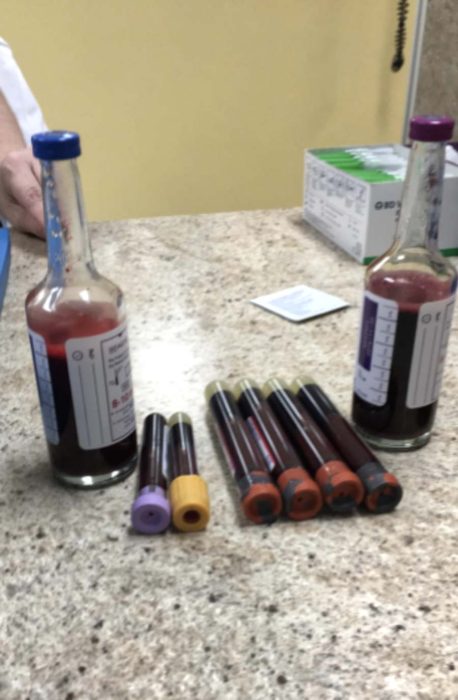
One of Melanie’s many blood draws (photo courtesy of author – do not reprint)
I was then put on the pill, despite telling doctors I was a smoker, which poses a huge risk of blood clots; again, I was not warned of this risk at the time. After a year of falling deeper and deeper into depression and eventually becoming suicidal, my now-fiancé suggested that I stop birth control altogether. I fought this for a few weeks, refusing to accept that this could be making me feel so terrible. Eventually, I could not take it anymore and I was willing to try anything — so I finally stopped.
A dramatic change
Since stopping birth control in 2021, my life has changed dramatically. My cycle has finally regulated, I get “normal” periods now, I am ovulating again, and I feel so much better mentally and physically.
Looking back, I can see things more clearly. Rather than having birth control shoved into me, I wish I was taught that sex is a big deal and my body is valuable. I wish it were not normalized as something teenagers just do because, honestly, I had no desire to do it. It’s almost as if getting birth control made me feel as though I should be having sex.
Secondly, I was never, not once, informed of the potential negative consequences and adverse reactions I could be subject to, nor was it ever suggested to me that my birth control could be causing my medical issues. I understand that I cannot prove that this is the cause, however, since removing it my autoimmune issues have subsided without relapse, and the only issues I have are my hormones regulating after stopping (again, I could write a whole other story about coming off of birth control and the time it took for my hormones to resume to normal levels). I had no idea of the significance of hormone health, nor did I realize how deeply it affects both the body and mind.
I wish somebody had told me.







